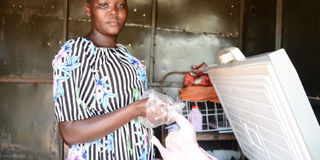Covid-19: How a poultry farmer can stay afloat

Suzan Biyinzika is now selling a broiler bird weighing two kilogrammes at a paltry Shs10,000. Before Covid-19, the farmer was earning Shs15,000 for the same bird. Photo by George Katongole.
Poultry meat is a perishable food item because its nutrients can help the growth of bacteria. Its perishability has put, especially those that keep broilers, on tenterhooks.
Broilers kept for commercial purposes normally reach slaughter weight of about two kilogrammes at between five to seven weeks yet the lockdown which has been in place since March 18 to contain the spread of the Coronavirus, has left many farmers with more questions than answers.
Cross border trade to Kenya where Uganda was supplying between 25 and 40 tonnes a week, have also been disrupted. On top of that there is resistance by the Kenya Poultry Breeders Association (KPBA) which claim Ugandan imports are eating into their market.
Locally, stocks of chicken meat in excess of the current requirements are, however, having a huge impact on live chicken prices.
Currently, as a means of keeping in business, several farmers hire trucks and hawk the live birds in small towns. Others have taken to cold storage. But the prices have been deteriorating with each bird being sold at about Shs10,000.
The competing commodities, beef and pork, which would have provided an opportunity, remain low.
Most markets for chicken have been driven by stylish consumer tastes but several top-notch restaurants have been closed.
According to Godfrey Kigoye, co-founder of Katende-Harambe Rural-Urban Centre in Namugongo-Nsawo Village in Wakiso District, chicken, meat and other livestock have been classified as essential commodities.
“However, the restrictions on movement of vehicles is disrupting the supply-chain at various levels- hatcheries, feed mills, poultry farms and retail outlets. The fact that there is mortality and perishability involved in the trade makes it vulnerable,” says Kigoye. Katende Harambe farm located on a five-acre piece of land operates 16 urban farming projects including poultry.
“All forms of agriculture face many unforeseen challenges including weather and Covid-19 just aggravated the situation,” Kigoye, an agriculturist, says. He adds that farmers should do their bit to sustain their livelihoods and keep in business as much as possible.
Cold storage
Big processors such as Biyinzika Poultry maintain quality, safety and profit by investing in cold storage facilities. These machines have regulated temperature which should not exceed 4°C. The crates which keep slaughtered animals are disinfected with air-tight packaging.
Suzan Biyinzika, a cold storage operator of a stall at Wantoni in Mukono District says she is open just to keep face although business remains low.
Before the Covid-19 lockdown, she was stocking more than 10 kilogrammes of chicken from Yo Kuku and sometimes Biyinzika, but currently her stock is four kilogrammes, which can stay for two days.
Her main customers were roadside vendors who used to roast chicken in the evening, restaurants, schools and bar grills, which have all been closed for more than one month. Although it is an option to keep chicken under cold storage, she explains that this is not the best time for any farmers.
“I doubt it is a good time to slaughter any chicken. There is a lot of uncertainty surrounding the lockdown and you wonder how soon it will normalize. I think farmers need to sell live birds and keep persevering,” Biyinzika, who started this business in November last year, says.
James Mugerwa, who stocked chicken intended for Eid celebrations said this is a time to employ a military-like approach. “Farmers should focus on worst-case scenarios. Contamination is a possibility now therefore, extra care should be taken with workers,” he explains.
But brooders have not been spared by the pandemic either. Mugerwa says that many brooders have uncollected stock which has stayed with farmers. At Chicken Masters, uncollected stock has been kept and such chicken sells for Shs6,000.
“We hope that the virus passes with minimum disruption, but it’s not looking that way,” Mugerwa says.
Rethinking marketing
Dr Haruna Kaaya, the Managing Director of Chick Masters, a livestock and consultancy company in Mukono, explains that there is need to rethink the general marketing plan.
“Covid-19 has taught us to treat our poultry business as real business with proper marketing strategies,” Kaaya said. A marketing plan normally involves how much one plans to sell, determining the target customers, pricing and promotion of the product.
Pre-Covid, chicken consumption reflected the growing demand for white meat and value-added products such as chicken parts-- breasts, wings, drumsticks and gizzards, which added convenience to consumers, but most have turned to basics like eating cheaper options. Kaaya adds that it is important to track costs of production at all times.
“Keeping chicken longer may not be advisable. If anyone is offering a decent price, it is better to sell them off. But there is an opportunity for Eid where some chicken will be consumed,” he says.
Export market
Latest market reports indicate that chicken meat import price in Africa stood at $ 1,038 per tonne in 2018. Angola and South Africa represent the major importers of chicken meat in 2018, accounting for near 23 and 20 per cent of total imports, respectively. Ghana (213,000 tonnes) ranks next in terms of the total imports with a 12 share.




